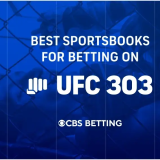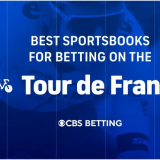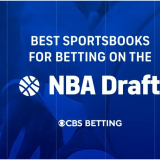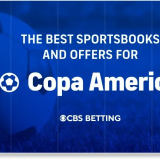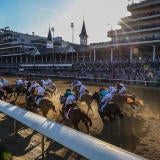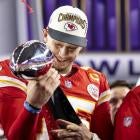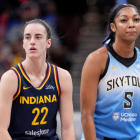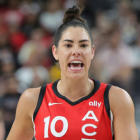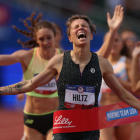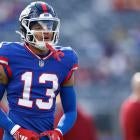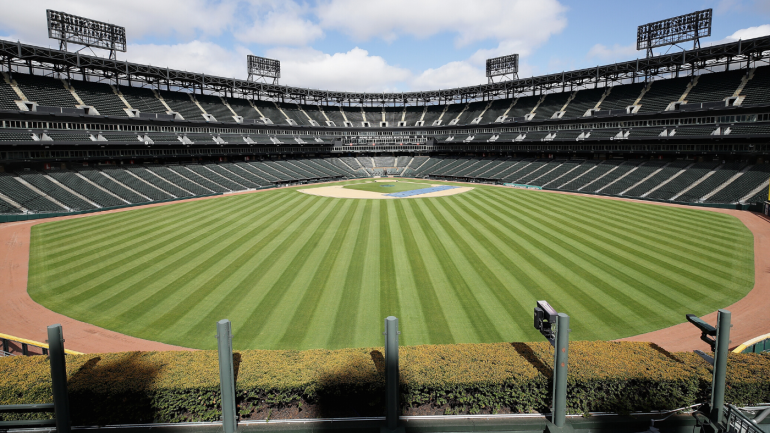
As the severity of the coronavirus crisis became apparent back in March, sports were one of the first things to shut down completely. The pure nature of sporting events make them dangerous during a pandemic like this one, with players sharing equipment, sitting in close quarters and celebrating together as fans sit arm to arm cheering and high-fiving strangers.
When the sports world came to a stop, resuming seemed nearly impossible, and even as leagues have found a way to return, resuming as it used to be still seems unthinkable.
CBS Sports spoke to Dr. Anne Rimoin, Professor of Epidemiology at UCLA Fielding School of Public Health regarding the current state of sports and how she predicts it will go in the unpredictable world we live in.
Fans were itching to see sports again on their televisions, and now that it's back, they want to be in on the action.
As some, like college football, are forced to cancel seasons completely for safety reasons, some sporting events are opening doors to fans.
Dr. Rimoin says people may be moving too fast when it comes to attending games, saying, "we have to be careful about sacrificing future greater gain for present pleasure."
She says that any opportunity the virus has to spread, it will take advantage of, so large gatherings in one place are very risky for both the people involved and flattening the curve.
Dr. Rimoin said:
"I think in the in the short term, until we have a real handle on this virus, until we are in front of it, we're not going to be able to safely enjoy physically being at a sporting event as a spectator ... We're in a situation where the risk is just too high, and we have to remember that there's a cost to everything. We have to really think about what's important to us right now and where our priorities are."
Everyone is itching to get back to their normal lives and the end seems far off, but Dr. Rimoin says pushing it right now could only make the pandemic last even longer.
Going back to sporting events does not necessarily need to wait until there is a vaccine however, she says getting the rate of viral transmission down to a very low level in order to make contact tracing possible could be a game changer.
Anyone who does go to games now should go through a list of precautionary measures before attending. Dr. Rimoin says being outside, wearing a mask and being in an area where transmission rate is low is key, and even then, people shouldn't be letting their guard down.
If and when a vaccine is developed and transmission rates go down, there are likely going to be major changes at sporting events. With everyone now adjusted to social distancing and masks, those two elements could carry over into arenas and stadiums for the foreseeable future.
It would seem that many fans will be less likely to want to interact with other fans to avoid any contact, players might not want to play pre-game catch with fans or jump into the stands after a touchdown. They might not sign baseballs after games in fear of getting in contact with anyone.
For now, the reality is that even leagues without fans are seeing problems with positive cases if they aren't in a bubble.
Major League Baseball, a league without the bubble, is proving the importance of the one, as they have seen multiple teams with COVID-19 outbreaks. More than 30 games have been postponed to date due to positive cases and teams have reworked their schedule to make up for those lost games.
MLB is now reportedly looking into carrying out the postseason in a bubble to ensure they can carry it out, have no delays and keep the teams safe.
When discussing whether or not she feels a bubble is necessary, Dr. Rimoin says "there's really no choice" other than to have them, because it is hard for people to self quarantine. Mentioning the people they also interact with outside of sports, she notes that preventing a spread of the virus without closing off the sport would be extremely difficult.
"The only way to be able to do this safely is with a very carefully enforced bubble," she says.
As much as MLB has struggled, the NHL and NBA have had rather smooth experiences, as their bubbles are working and they continue to report no positive cases throughout the weeks.
Dr. Rimoin says now is not the time to be experiencing with people's lives, adding that the bubble does not just protect the players inside of it, but the population around it.
Each sport has varying levels of contact, but even those with minimal contact, the exposure is still there. As exposure increases, the players are at more of a risk if they aren't in a bubble, which means everyone they come in contact with on the outside is at higher risk as well.
Many have questioned whether such a high contact sport as football would be able to carry out a safe season without a bubble.
The NFL is optimistic, but players will need to self-police, quarantine as much as possible and testing will be crucial.
Unlike the other major North American leagues, the NFL did not creating a league-wide policy on fan attendance and is letting each team choose if and how many fans they will welcome.
Some, including defending Super Bowl champion Kansas City Chiefs, will have fans from the start. Adding fans into the mix brings in an extra layer of uncertainty and a higher risk of spreading the virus.
Quoting Yogi Berra, Dr. Rimoin said looking ahead, "The future ain't what it used to be."
She acknowledges and understands that "everybody is tired of the pandemic," but says now is not the time to be going back to normal and instead should be the time where we are all the most cautious.


